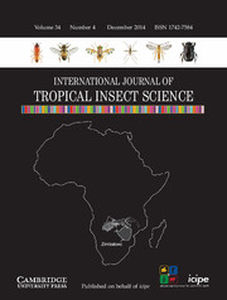Crossref Citations
This article has been cited by the following publications. This list is generated based on data provided by
Crossref.
Lundström, Jan O.
Lindström, Karin M.
Olsen, Björn
Dufva, Reija
and
Krakower, Douglas S.
2001.
Prevalence of Sindbis Virus Neutralizing Antibodies Among Swedish Passerines Indicates that Thrushes are the Main Amplifying Hosts.
Journal of Medical Entomology,
Vol. 38,
Issue. 2,
p.
289.
Bodin, Aurélie
Vinauger, Clément
and
Lazzari, Claudio R.
2009.
Behavioural and physiological state dependency of host seeking in the blood-sucking insectRhodnius prolixus.
Journal of Experimental Biology,
Vol. 212,
Issue. 15,
p.
2386.
Julião, G. R.
Abad-Franch, F.
Lourenço-de-Oliveira, R.
and
Luz, S.L.B.
2010.
Measuring Mosquito Diversity Patterns in an Amazonian Terra Firme Rain Forest.
Journal of Medical Entomology,
Vol. 47,
Issue. 2,
p.
121.
Cator, Lauren J.
George, Justin
Blanford, Simon
Murdock, Courtney C.
Baker, Thomas C.
Read, Andrew F.
and
Thomas, Matthew B.
2013.
‘Manipulation’ without the parasite: altered feeding behaviour of mosquitoes is not dependent on infection with malaria parasites.
Proceedings of the Royal Society B: Biological Sciences,
Vol. 280,
Issue. 1763,
p.
20130711.
Lord, C. C.
Alto, B. W.
Anderson, S. L.
Connelly, C. R.
Day, J. F.
Richards, S. L.
Smartt, C. T.
and
Tabachnick, W. J.
2014.
Can Horton Hear the Whos? The Importance of Scale in Mosquito-Borne Disease.
Journal of Medical Entomology,
Vol. 51,
Issue. 2,
p.
297.
Gonzalez, Maximiliano Baez
and
Rodas, Guillermo Gonzalez
2015.
Predictive model of dengue focus applied to geographic information systems.
p.
1.
Lutz, Holly L.
Hochachka, Wesley M.
Engel, Joshua I.
Bell, Jeffrey A.
Tkach, Vasyl V.
Bates, John M.
Hackett, Shannon J.
Weckstein, Jason D.
and
Spielmann, Tobias
2015.
Parasite Prevalence Corresponds to Host Life History in a Diverse Assemblage of Afrotropical Birds and Haemosporidian Parasites.
PLOS ONE,
Vol. 10,
Issue. 4,
p.
e0121254.
Robertson, Suzanne L.
and
Caillouët, Kevin A.
2016.
A host stage-structured model of enzootic West Nile virus transmission to explore the effect of avian stage-dependent exposure to vectors.
Journal of Theoretical Biology,
Vol. 399,
Issue. ,
p.
33.
Yan, Jiayue
Gangoso, Laura
Martínez-de la Puente, Josué
Soriguer, Ramón
and
Figuerola, Jordi
2017.
Avian phenotypic traits related to feeding preferences in two Culex mosquitoes.
The Science of Nature,
Vol. 104,
Issue. 9-10,
Beebe, Taylor
and
Robertson, Suzanne
2017.
A Two-species Stage-structured Model for West Nile Virus Transmission.
Letters in Biomathematics,
Vol. 4,
Issue. 1,
Grutter, A. S.
Blomberg, S. P.
Fargher, B.
Kuris, A. M.
McCormick, M. I.
and
Warner, R. R.
2017.
Size-related mortality due to gnathiid isopod micropredation correlates with settlement size in coral reef fishes.
Coral Reefs,
Vol. 36,
Issue. 2,
p.
549.
Yan, Jiayue
Martínez-de la Puente, Josué
Gangoso, Laura
Gutiérrez-López, Rafael
Soriguer, Ramón
and
Figuerola, Jordi
2018.
Avian malaria infection intensity influences mosquito feeding patterns.
International Journal for Parasitology,
Vol. 48,
Issue. 3-4,
p.
257.
Matherne, Marguerite E.
Cockerill, Kasey
Zhou, Yiyang
Bellamkonda, Mihir
and
Hu, David L.
2018.
Mammals repel mosquitoes with their tails.
Journal of Experimental Biology,
Vol. 221,
Issue. 20,
Bradshaw, William E.
Burkhart, Joshua
Colbourne, John K.
Borowczak, Rudyard
Lopez, Jacqueline
Denlinger, David L.
Reynolds, Julie A.
Pfrender, Michael E.
and
Holzapfel, Christina M.
2018.
Evolutionary transition from blood feeding to obligate nonbiting in a mosquito.
Proceedings of the National Academy of Sciences,
Vol. 115,
Issue. 5,
p.
1009.
Yan, Jiayue
Broggi, Juli
Martínez-de la Puente, Josué
Gutiérrez-López, Rafael
Gangoso, Laura
Soriguer, Ramón
and
Figuerola, Jordi
2018.
Does bird metabolic rate influence mosquito feeding preference?.
Parasites & Vectors,
Vol. 11,
Issue. 1,
Brugman, Victor A.
Hernández-Triana, Luis M.
Medlock, Jolyon M.
Fooks, Anthony R.
Carpenter, Simon
and
Johnson, Nicholas
2018.
The Role of Culex pipiens L. (Diptera: Culicidae) in Virus Transmission in Europe.
International Journal of Environmental Research and Public Health,
Vol. 15,
Issue. 2,
p.
389.
Cribellier, Antoine
van Erp, Jens A.
Hiscox, Alexandra
Lankheet, Martin J.
van Leeuwen, Johan L.
Spitzen, Jeroen
and
Muijres, Florian T.
2018.
Flight behaviour of malaria mosquitoes around odour-baited traps: capture and escape dynamics.
Royal Society Open Science,
Vol. 5,
Issue. 8,
p.
180246.
Allahverdipour, Hana Haji
Talaei-Hassanloui, Reza
Karimi, Javad
Wang, Yi
Rochlin, Ilia
and
Gaugler, Randy
2019.
Behavior manipulation of mosquitoes by a mermithid nematode.
Journal of Invertebrate Pathology,
Vol. 168,
Issue. ,
p.
107273.
Benoit, Joshua B
Lazzari, Claudio R
Denlinger, David L
and
Lahondère, Chloé
2019.
Thermoprotective adaptations are critical for arthropods feeding on warm-blooded hosts.
Current Opinion in Insect Science,
Vol. 34,
Issue. ,
p.
7.
Nouage, Lynda
Elanga-Ndille, Emmanuel
Binyang, Achille
Tchouakui, Magellan
Atsatse, Tatiane
Ndo, Cyrille
Kekeunou, Sévilor
Wondji, Charles S.
and
Brooke, Basil
2020.
Influence of GST- and P450-based metabolic resistance to pyrethroids on blood feeding in the major African malaria vector Anopheles funestus.
PLOS ONE,
Vol. 15,
Issue. 9,
p.
e0230984.


